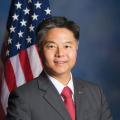-
Builds PowerBuilds ProgressBuilds Representation
-
Rep. Ted Lieu is from Taiwan and immigrated to the United States at age three and currently resides in Torrance, CA. He is the incumbent, having served in Congress since 2015. According to campaign materials, Rep. Lieu is running to keep his seat because he is the leader that best reflects the needs of the people in his district.
In Congress, Rep. Lieu has been a voice and advocate for marginalized communities. He was an initial author of legislation to ban so-called “gay conversion therapy” and has been leading the fight to end the unjust system of money bail. He currently sits on the House Committee on the Judiciary and the House Committee on Foreign Affairs, as well as four subcommittees. Prior to Rep. Lieu’s election to Congress, he served in the Torrance City Council, State Assembly, and State Senate.
Rep. Lieu is running against Liz Barris (B), Albert Maxwell Goldberg (D), James P. Bradley (R), Sarah Sun Liew (R), and Kenneth Wright (NPP). Rep. Lieu is the best progressive choice because of his track record of advancing progressive policies and his commitment to being a leader that reflects the needs of the people.
According to our analysis, Rep. Lieu is the strongest choice for progressive leadership in office.
Last updated: 2023-04-05Ted Lieu
Rep. Ted Lieu is from Taiwan and immigrated to the United States at age three and currently resides in Torrance, CA. He is the incumbent, having served in Congress since 2015. According to campaign materials, Rep.
Rep. Ted Lieu is from Taiwan and immigrated to the United States at age three and currently resides in Torrance, CA. He is the incumbent, having served in Congress since 2015. According to campaign materials, Rep. Lieu is running to keep his seat because he is the leader that best reflects the needs of the people in his district.
In Congress, Rep. Lieu has been a voice and advocate for marginalized communities. He was an initial author of legislation to ban so-called “gay conversion therapy” and has been leading the fight to end the unjust system of money bail. He currently sits on the House Committee on the Judiciary and the House Committee on Foreign Affairs, as well as four subcommittees. Prior to Rep. Lieu’s election to Congress, he served in the Torrance City Council, State Assembly, and State Senate.
Rep. Lieu is running against Liz Barris (B), Albert Maxwell Goldberg (D), James P. Bradley (R), Sarah Sun Liew (R), and Kenneth Wright (NPP). Rep. Lieu is the best progressive choice because of his track record of advancing progressive policies and his commitment to being a leader that reflects the needs of the people.
According to our analysis, Rep. Lieu is the strongest choice for progressive leadership in office.
Ted Lieu
Rep. Ted Lieu is from Taiwan and immigrated to the United States at age three and currently resides in Torrance, CA. He is the incumbent, having served in Congress since 2015. According to campaign materials, Rep.
58th Assembly District
Not in 58th Assembly District? Click here to choose your customized guide.
Congress
Depending on where you live, you may have one of the below congressional districts on your ballot.
-
Builds PowerBuilds Representation
-
Representative Norma Torres is from Guatemala and immigrated to the United States at five-years-old. She is a longtime resident of the Inland Empire and currently resides in Pomona, CA. Rep. Torres is the incumbent, having served in Congress since 2015. According to campaign materials, she is running for re-election to continue her fight against Republicans’ regressive policies.
In Congress, Rep. Torres has worked to address issues of national security by solving cyber security vulnerabilities at shipping ports. Furthermore, she has advanced initiatives to address the root causes of migration from Central America and public safety concerns of indigenous communities. Rep. Torres currently sits on the Appropriations Committee and the Rules Committee. Prior to her election to Congress, she served as the Mayor of Pomona, CA, in the State Assembly, and the State Senate where she worked to promote diversity in leadership. She also successfully fought to restore local authority of the Ontario Airport, and played a pivotal role in developing the “Keep Your Home California” program, which allowed over 80,000 families to stay in their homes and avoid foreclosures following the Great Recession.
Rep. Torres is being challenged by Mike Cargile (R). Though we disagree with some of Rep. Torres’ votes on military spending, border security, and healthcare, her progressive stances on education and the environment, as well as her relationships with partners, make her a strong choice in this race.
Last updated: 2023-04-05
Representative Norma Torres is from Guatemala and immigrated to the United States at five-years-old. She is a longtime resident of the Inland Empire and currently resides in Pomona, CA. Rep. Torres is the incumbent, having served in Congress since 2015. According to campaign materials, she is running for re-election to continue her fight against Republicans’ regressive policies.
In Congress, Rep. Torres has worked to address issues of national security by solving cyber security vulnerabilities at shipping ports. Furthermore, she has advanced initiatives to address the root causes of migration from Central America and public safety concerns of indigenous communities. Rep. Torres currently sits on the Appropriations Committee and the Rules Committee. Prior to her election to Congress, she served as the Mayor of Pomona, CA, in the State Assembly, and the State Senate where she worked to promote diversity in leadership. She also successfully fought to restore local authority of the Ontario Airport, and played a pivotal role in developing the “Keep Your Home California” program, which allowed over 80,000 families to stay in their homes and avoid foreclosures following the Great Recession.
Rep. Torres is being challenged by Mike Cargile (R). Though we disagree with some of Rep. Torres’ votes on military spending, border security, and healthcare, her progressive stances on education and the environment, as well as her relationships with partners, make her a strong choice in this race.
State Senate
Depending on where you live, you may have one of the below State Senate races on your ballot.
-
Builds PowerBuilds ProgressBuilds Representation
-
Monique Limón is a lifelong resident of Santa Barbara. According to campaign materials, she is running for State Senate because she understands the values of the region and will use her public service experience to advocate for environmental protection, educational reforms, and improved healthcare access.
Limón is a member of the California State Assembly, where she uses her understanding of her community to establish meaningful legislation to positively impact educational outcomes and environmental protections. She acted as the Chair of the Assembly Select Committee on Natural Disaster Response, Recovery, and Rebuilding, and worked to improve emergency communication and fire prevention. Prior to serving in the Assembly, Limón served two terms on the Santa Barbara Unified School Board, and acted as the Assistant Director for the McNair Scholars program at UCSB.
Limón is running for this open seat against Gary J. Michaels (R), and Anastasia Stone (NPP). In 2019 she scored a 90 out of 100 on Courage Score, our annual analysis of a legislator's progressive voting records. According to recent election results, Democrats can win this seat but it's often a close race. Limón is the most progressive choice because of her track record of championing education reform, working toward stronger environmental protections, and pushing for improved emergency responses.
According to our analysis, Monique Limón is the strongest choice for progressive leadership in office.
Last updated: 2023-04-05Monique Limón
Monique Limón is a lifelong resident of Santa Barbara.
Monique Limón is a lifelong resident of Santa Barbara. According to campaign materials, she is running for State Senate because she understands the values of the region and will use her public service experience to advocate for environmental protection, educational reforms, and improved healthcare access.
Limón is a member of the California State Assembly, where she uses her understanding of her community to establish meaningful legislation to positively impact educational outcomes and environmental protections. She acted as the Chair of the Assembly Select Committee on Natural Disaster Response, Recovery, and Rebuilding, and worked to improve emergency communication and fire prevention. Prior to serving in the Assembly, Limón served two terms on the Santa Barbara Unified School Board, and acted as the Assistant Director for the McNair Scholars program at UCSB.
Limón is running for this open seat against Gary J. Michaels (R), and Anastasia Stone (NPP). In 2019 she scored a 90 out of 100 on Courage Score, our annual analysis of a legislator's progressive voting records. According to recent election results, Democrats can win this seat but it's often a close race. Limón is the most progressive choice because of her track record of championing education reform, working toward stronger environmental protections, and pushing for improved emergency responses.
According to our analysis, Monique Limón is the strongest choice for progressive leadership in office.
Monique Limón
Monique Limón is a lifelong resident of Santa Barbara.
-
Builds PowerBuilds ProgressBuilds Representation
-
Josh Newman is a veteran from Orange County and currently resides in Fullerton, CA. According to campaign materials, he is running for State Senate to stand up for California by putting people and working families' needs over corporate interests.
Newman previously served as a State Senator, where he focused on advancing policies to improve veteran and mental health services, as well as initiatives to promote public education, jobs, and infrastructure improvements. Following the legislature's approval of a bill to repair the state’s aging transportation infrastructure in 2017, Senate Bill 1, Newman was singled out by a well-funded, hyper-partisan campaign that resulted in his recall. Prior to his election to the State Senate, he served as a United States Army officer, business owner, as well as a veteran and community activist.
Newman is running against Ling Ling Chang (R) who is the incumbent and has held the seat since 2018, and Joseph Cho, Ph.D. (D). Newman is the best progressive choice because of his track record of putting the people of California above politics.
According to our analysis, Newman is the strongest choice for progressive leadership in office.Last updated: 2023-04-05Josh Newman
Josh Newman is a veteran from Orange County and currently resides in Fullerton, CA. According to campaign materials, he is running for State Senate to stand up for California by putting people and working families' needs over corporate interests.
Josh Newman is a veteran from Orange County and currently resides in Fullerton, CA. According to campaign materials, he is running for State Senate to stand up for California by putting people and working families' needs over corporate interests.
Newman previously served as a State Senator, where he focused on advancing policies to improve veteran and mental health services, as well as initiatives to promote public education, jobs, and infrastructure improvements. Following the legislature's approval of a bill to repair the state’s aging transportation infrastructure in 2017, Senate Bill 1, Newman was singled out by a well-funded, hyper-partisan campaign that resulted in his recall. Prior to his election to the State Senate, he served as a United States Army officer, business owner, as well as a veteran and community activist.
Newman is running against Ling Ling Chang (R) who is the incumbent and has held the seat since 2018, and Joseph Cho, Ph.D. (D). Newman is the best progressive choice because of his track record of putting the people of California above politics.
According to our analysis, Newman is the strongest choice for progressive leadership in office.Josh Newman
Josh Newman is a veteran from Orange County and currently resides in Fullerton, CA. According to campaign materials, he is running for State Senate to stand up for California by putting people and working families' needs over corporate interests.
-
Builds Power
-
Richard Roth is from Columbus, Ohio and moved to Riverside in 1978. He is the incumbent, having served in this position since 2012. According to campaign materials he is running to keep his seat to continue to build on his military and legal career by working on budget and healthcare issues in the legislature.
In the State Senate, Roth has worked on legislation to improve funding for a public medical school in Riverside and transportation improvements, to provide protection for the Mojave, to expand access to higher education in underserved communities, and to support K-12 mental health services. Roth currently serves as Chair of the Senate Budget Subcommittee No. 1 on Education, and the Vice-Chair of the Joint Legislative Audit Committee. He also serves on an additional 10 policy committees, including Rules, Transportation, Veteran’s Affairs, Budget & Fiscal Review, and Housing. Prior to his election to the State Senate, Roth served in the JAG Corps and the Air Force Reserves, acting as a reserve judge advocate and reaching the rank of Major General before his 2007 retirement. As an attorney, Roth practiced labor and employment law in private practice and has taught law at UC-Riverside. As a community member, Roth served as the Chairman of the Board of the Greater Riverside Chambers of Commerce, and President of the Monday Morning Group. He has been an active board member with several legal organizations and worked with the Parkview Community Hospital and the Riverside Art Museum.
Roth has progressive positions on education funding, healthcare, and transportation infrastructure. That said, he has voted against several progressive bills, including tenant housing protections and prohibiting biometric data being recorded by police body cameras.
Roth is running unopposed in this race. This year, he scored 58 out of 100 on Courage Score, our annual analysis of legislators’ progressive voting record. According to recent election results, Democrats can win this seat but it's often a close race. Though we disagree with Roth’s stance on the issues listed above, his long record of public service and strong base in a difficult to win district supports progressive momentum and makes him a strong choice in this race.
Last updated: 2023-04-05
Richard Roth is from Columbus, Ohio and moved to Riverside in 1978. He is the incumbent, having served in this position since 2012. According to campaign materials he is running to keep his seat to continue to build on his military and legal career by working on budget and healthcare issues in the legislature.
In the State Senate, Roth has worked on legislation to improve funding for a public medical school in Riverside and transportation improvements, to provide protection for the Mojave, to expand access to higher education in underserved communities, and to support K-12 mental health services. Roth currently serves as Chair of the Senate Budget Subcommittee No. 1 on Education, and the Vice-Chair of the Joint Legislative Audit Committee. He also serves on an additional 10 policy committees, including Rules, Transportation, Veteran’s Affairs, Budget & Fiscal Review, and Housing. Prior to his election to the State Senate, Roth served in the JAG Corps and the Air Force Reserves, acting as a reserve judge advocate and reaching the rank of Major General before his 2007 retirement. As an attorney, Roth practiced labor and employment law in private practice and has taught law at UC-Riverside. As a community member, Roth served as the Chairman of the Board of the Greater Riverside Chambers of Commerce, and President of the Monday Morning Group. He has been an active board member with several legal organizations and worked with the Parkview Community Hospital and the Riverside Art Museum.
Roth has progressive positions on education funding, healthcare, and transportation infrastructure. That said, he has voted against several progressive bills, including tenant housing protections and prohibiting biometric data being recorded by police body cameras.
Roth is running unopposed in this race. This year, he scored 58 out of 100 on Courage Score, our annual analysis of legislators’ progressive voting record. According to recent election results, Democrats can win this seat but it's often a close race. Though we disagree with Roth’s stance on the issues listed above, his long record of public service and strong base in a difficult to win district supports progressive momentum and makes him a strong choice in this race.
County District Races
Depending on where you live, you may have the below county-districted races on your ballot.
-
Builds PowerBuilds ProgressBuilds Representation
-
Eddie Tejeda has lived in Redlands for over twenty years. According to campaign materials, he is running for Board of Supervisors to use his experiences as a local educator and City Councilman to continue to work to support the economy, improve transportation, and bolster climate protections.
Tejeda is a special education teacher and an elected member of the Redlands City Council, positions in which he has emphasized a commitment to serve his community. In City Council, Tejeda sits on the Parks & Recreation Advisory Committee, and the Municipal Utilities & Public Works Commission. He has been outspoken in his opposition to the Eastgate Air Cargo Facility project, supports mass transit improvements, and the establishment of higher density housing along transit corridors. Tejeda has a strong interest in investing in some of the under-resourced communities in District 3, like Mentone, and improving the overall infrastructure for cycling and the use of electric transportation.
Tejeda is running against Kaisar Ahmed, Roy George, Karen Ickes, Latron Lester, and incumbent Dawn Rowe, who was appointed in 2018. Rowe's appointment, however, has come under scrutiny and she is currently not “acting in an official capacity” while an appeal is heard regarding the legality of her appointment. Tejeda is the best choice because of his long history in the community and his strong vision of improving the district’s environmental efficiency, housing density, and development strategy.
According to our analysis, Eddie Tejeda is the strongest choice for progressive leadership in office.
Last updated: 2023-04-05Eddie Tejeda
Eddie Tejeda has lived in Redlands for over twenty years. According to campaign materials, he is running for Board of Supervisors to use his experiences as a local educator and City Councilman to continue to work to support the economy, improve transportation, and bolster climate protections.
Tejeda is a special education teacher and an elected member of the Redlands City Council, positions in which he has emphasized a commitment to serve his community. In City Council, Tejeda sits on the Parks & Recreation Advisory Committee, and the Municipal Utilities & Public Works Commission. He has been outspoken in his opposition to the Eastgate Air Cargo Facility project, supports mass transit improvements, and the establishment of higher density housing along transit corridors. Tejeda has a strong interest in investing in some of the under-resourced communities in District 3, like Mentone, and improving the overall infrastructure for cycling and the use of electric transportation.
Tejeda is running against Kaisar Ahmed, Roy George, Karen Ickes, Latron Lester, and incumbent Dawn Rowe, who was appointed in 2018. Rowe's appointment, however, has come under scrutiny and she is currently not “acting in an official capacity” while an appeal is heard regarding the legality of her appointment. Tejeda is the best choice because of his long history in the community and his strong vision of improving the district’s environmental efficiency, housing density, and development strategy.
According to our analysis, Eddie Tejeda is the strongest choice for progressive leadership in office.
Eddie Tejeda has lived in Redlands for over twenty years. According to campaign materials, he is running for Board of Supervisors to use his experiences as a local educator and City Councilman to continue to work to support the economy, improve transportation, and bolster climate protections.
Tejeda is a special education teacher and an elected member of the Redlands City Council, positions in which he has emphasized a commitment to serve his community. In City Council, Tejeda sits on the Parks & Recreation Advisory Committee, and the Municipal Utilities & Public Works Commission. He has been outspoken in his opposition to the Eastgate Air Cargo Facility project, supports mass transit improvements, and the establishment of higher density housing along transit corridors. Tejeda has a strong interest in investing in some of the under-resourced communities in District 3, like Mentone, and improving the overall infrastructure for cycling and the use of electric transportation.
Tejeda is running against Kaisar Ahmed, Roy George, Karen Ickes, Latron Lester, and incumbent Dawn Rowe, who was appointed in 2018. Rowe's appointment, however, has come under scrutiny and she is currently not “acting in an official capacity” while an appeal is heard regarding the legality of her appointment. Tejeda is the best choice because of his long history in the community and his strong vision of improving the district’s environmental efficiency, housing density, and development strategy.
According to our analysis, Eddie Tejeda is the strongest choice for progressive leadership in office.
Eddie Tejeda
Eddie Tejeda has lived in Redlands for over twenty years. According to campaign materials, he is running for Board of Supervisors to use his experiences as a local educator and City Councilman to continue to work to support the economy, improve transportation, and bolster climate protections.
Tejeda is a special education teacher and an elected member of the Redlands City Council, positions in which he has emphasized a commitment to serve his community. In City Council, Tejeda sits on the Parks & Recreation Advisory Committee, and the Municipal Utilities & Public Works Commission. He has been outspoken in his opposition to the Eastgate Air Cargo Facility project, supports mass transit improvements, and the establishment of higher density housing along transit corridors. Tejeda has a strong interest in investing in some of the under-resourced communities in District 3, like Mentone, and improving the overall infrastructure for cycling and the use of electric transportation.
Tejeda is running against Kaisar Ahmed, Roy George, Karen Ickes, Latron Lester, and incumbent Dawn Rowe, who was appointed in 2018. Rowe's appointment, however, has come under scrutiny and she is currently not “acting in an official capacity” while an appeal is heard regarding the legality of her appointment. Tejeda is the best choice because of his long history in the community and his strong vision of improving the district’s environmental efficiency, housing density, and development strategy.
According to our analysis, Eddie Tejeda is the strongest choice for progressive leadership in office.
-
Builds PowerBuilds ProgressBuilds Representation
-
Dan Flores is a lifelong resident of District 5, and lives in Colton. According to campaign materials he is running for Board of Supervisors to use his extensive knowledge of the county to continue to create benefits for students, families, and seniors.
Flores is Chief of Staff to the current Fifth District Supervisor, Josie Gonzalez, where he works to promote County level action to improve educational outcomes, housing access, and public systems. He has led efforts to increase the availability of affordable housing, particularly for seniors, and has worked on updating community facilities, libraries, and parks. Flores was elected to the Colton Joint Unified School Board in 2012, and was instrumental in the establishment of preferential admissions partnerships with California University of Science and Medicine and California State University at San Bernardino. He also pushed for capital improvements to school buildings, and advocated for a more robust pipeline for college and vocational school.
Flores is running against Joe Baca Jr, Nadia Renner, and Jesse Armendarez for this open seat. Flores is the best progressive choice because of his long history in the community, and his demonstrated interest in developing local collaborations that improve outcomes for students and families.
According to our analysis, Dan Flores is the strongest choice for progressive leadership in office.
Last updated: 2023-04-05Dan Flores
Dan Flores is a lifelong resident of District 5, and lives in Colton. According to campaign materials he is running for Board of Supervisors to use his extensive knowledge of the county to continue to create benefits for students, families, and seniors.
Flores is Chief of Staff to the current Fifth District Supervisor, Josie Gonzalez, where he works to promote County level action to improve educational outcomes, housing access, and public systems. He has led efforts to increase the availability of affordable housing, particularly for seniors, and has worked on updating community facilities, libraries, and parks. Flores was elected to the Colton Joint Unified School Board in 2012, and was instrumental in the establishment of preferential admissions partnerships with California University of Science and Medicine and California State University at San Bernardino. He also pushed for capital improvements to school buildings, and advocated for a more robust pipeline for college and vocational school.
Flores is running against Joe Baca Jr, Nadia Renner, and Jesse Armendarez for this open seat. Flores is the best progressive choice because of his long history in the community, and his demonstrated interest in developing local collaborations that improve outcomes for students and families.
According to our analysis, Dan Flores is the strongest choice for progressive leadership in office.
Dan Flores is a lifelong resident of District 5, and lives in Colton. According to campaign materials he is running for Board of Supervisors to use his extensive knowledge of the county to continue to create benefits for students, families, and seniors.
Flores is Chief of Staff to the current Fifth District Supervisor, Josie Gonzalez, where he works to promote County level action to improve educational outcomes, housing access, and public systems. He has led efforts to increase the availability of affordable housing, particularly for seniors, and has worked on updating community facilities, libraries, and parks. Flores was elected to the Colton Joint Unified School Board in 2012, and was instrumental in the establishment of preferential admissions partnerships with California University of Science and Medicine and California State University at San Bernardino. He also pushed for capital improvements to school buildings, and advocated for a more robust pipeline for college and vocational school.
Flores is running against Joe Baca Jr, Nadia Renner, and Jesse Armendarez for this open seat. Flores is the best progressive choice because of his long history in the community, and his demonstrated interest in developing local collaborations that improve outcomes for students and families.
According to our analysis, Dan Flores is the strongest choice for progressive leadership in office.
Dan Flores
Dan Flores is a lifelong resident of District 5, and lives in Colton. According to campaign materials he is running for Board of Supervisors to use his extensive knowledge of the county to continue to create benefits for students, families, and seniors.
Flores is Chief of Staff to the current Fifth District Supervisor, Josie Gonzalez, where he works to promote County level action to improve educational outcomes, housing access, and public systems. He has led efforts to increase the availability of affordable housing, particularly for seniors, and has worked on updating community facilities, libraries, and parks. Flores was elected to the Colton Joint Unified School Board in 2012, and was instrumental in the establishment of preferential admissions partnerships with California University of Science and Medicine and California State University at San Bernardino. He also pushed for capital improvements to school buildings, and advocated for a more robust pipeline for college and vocational school.
Flores is running against Joe Baca Jr, Nadia Renner, and Jesse Armendarez for this open seat. Flores is the best progressive choice because of his long history in the community, and his demonstrated interest in developing local collaborations that improve outcomes for students and families.
According to our analysis, Dan Flores is the strongest choice for progressive leadership in office.
-
VOTE YES
Vote YES On Prop 13, School and College Facilities Bond
-
This proposition would provide $9 billion for desperately needed renovations to public preschools and grade schools throughout the state, and $6 billion for construction to community colleges, the Cal State system, and the UC system. This will allow the state of California to use tax revenue to pay for improvements that local communities cannot afford.
The funding would come from bonds the state would pay back over 35 years, totaling an estimated $26 billion, which includes $15 billion in principal and $11 billion in interest. This investment is well worth the costs. It takes money, after all, to ensure that students -- especially those in districts that can’t afford major capital improvement projects -- do not have to learn in dangerous environments.
The vast majority of Democrats in the state legislature support it, as does Gov. Newsom, and the only major opposition is a group called the Howard Jarvis Taxpayers Association. This is the group famous for destroying California’s school funding system in 1978 through another proposition, ironically one that was also dubbed Prop 13. The group spends most of its time lobbying to reduce tax rates. It has never shown any interest in supporting California’s children, at least if that means wealthy individuals or giant corporations would pay their fair share in taxes.
Critics of the measure have pointed out that the ballot measure’s language includes a provision that frees new multi-family developments around subway stops and bus stations from school impact fees. This provision will make it easier for developers to build apartment buildings within a half-mile of public transit but could also drive up the cost of new housing and take funds away from school districts across the state. Despite this provision, the measure is still supported by most education groups in the state, who believe the overall funding allocation to schools outweighs the impact of reduced funding to school districts located near transit hubs. 2020’s Prop 13 is worth the investment since it means children will soon be able to attend school in buildings that are retrofitted to withstand earthquakes and no longer have lead in their water.
We strongly recommend a YES vote on Prop 13.
Last updated: 2023-04-05This proposition would provide $9 billion for desperately needed renovations to public preschools and grade schools throughout the state, and $6 billion for construction to community colleges, the Cal State system, and the UC system. This will allow the state of California to use tax revenue to pay for improvements that local communities cannot afford.
The funding would come from bonds the state would pay back over 35 years, totaling an estimated $26 billion, which includes $15 billion in principal and $11 billion in interest. This investment is well worth the costs. It takes money, after all, to ensure that students -- especially those in districts that can’t afford major capital improvement projects -- do not have to learn in dangerous environments.
The vast majority of Democrats in the state legislature support it, as does Gov. Newsom, and the only major opposition is a group called the Howard Jarvis Taxpayers Association. This is the group famous for destroying California’s school funding system in 1978 through another proposition, ironically one that was also dubbed Prop 13. The group spends most of its time lobbying to reduce tax rates. It has never shown any interest in supporting California’s children, at least if that means wealthy individuals or giant corporations would pay their fair share in taxes.
Critics of the measure have pointed out that the ballot measure’s language includes a provision that frees new multi-family developments around subway stops and bus stations from school impact fees. This provision will make it easier for developers to build apartment buildings within a half-mile of public transit but could also drive up the cost of new housing and take funds away from school districts across the state. Despite this provision, the measure is still supported by most education groups in the state, who believe the overall funding allocation to schools outweighs the impact of reduced funding to school districts located near transit hubs. 2020’s Prop 13 is worth the investment since it means children will soon be able to attend school in buildings that are retrofitted to withstand earthquakes and no longer have lead in their water.
We strongly recommend a YES vote on Prop 13.
This proposition would provide $9 billion for desperately needed renovations to public preschools and grade schools throughout the state, and $6 billion for construction to community colleges, the Cal State system, and the UC system. This will allow the state of California to use tax revenue to pay for improvements that local communities cannot afford.
The funding would come from bonds the state would pay back over 35 years, totaling an estimated $26 billion, which includes $15 billion in principal and $11 billion in interest. This investment is well worth the costs. It takes money, after all, to ensure that students -- especially those in districts that can’t afford major capital improvement projects -- do not have to learn in dangerous environments.
The vast majority of Democrats in the state legislature support it, as does Gov. Newsom, and the only major opposition is a group called the Howard Jarvis Taxpayers Association. This is the group famous for destroying California’s school funding system in 1978 through another proposition, ironically one that was also dubbed Prop 13. The group spends most of its time lobbying to reduce tax rates. It has never shown any interest in supporting California’s children, at least if that means wealthy individuals or giant corporations would pay their fair share in taxes.
Critics of the measure have pointed out that the ballot measure’s language includes a provision that frees new multi-family developments around subway stops and bus stations from school impact fees. This provision will make it easier for developers to build apartment buildings within a half-mile of public transit but could also drive up the cost of new housing and take funds away from school districts across the state. Despite this provision, the measure is still supported by most education groups in the state, who believe the overall funding allocation to schools outweighs the impact of reduced funding to school districts located near transit hubs. 2020’s Prop 13 is worth the investment since it means children will soon be able to attend school in buildings that are retrofitted to withstand earthquakes and no longer have lead in their water.
We strongly recommend a YES vote on Prop 13.
CA Prop 13
This proposition would provide $9 billion for desperately needed renovations to public preschools and grade schools throughout the state, and $6 billion for construction to community colleges, the Cal State system, and the UC system.







